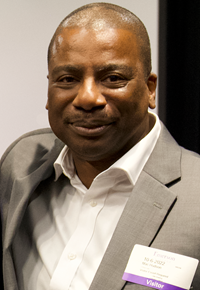
Reentry Support for College Students Leaving Prison: The Emerson Prison Initiative’s Reentry and College Outside Program
By Mneesha Gellman, 2021 – 2022 IIE Centennial Fellow
From College in Prison to College in Boston
Mac Hudson has been out of prison since September 2022. He was incarcerated at 17 years old, after time spent in the Department of Youth Services. Other than a brief time released in the early 2000s, he has spent the last thirty-three years of his life in Massachusetts prisons. During that time, Mac worked tirelessly to advocate for the rights of incarcerated people, going so far as to become the incarcerated representative on the Board of Directors for a vibrant non-profit, Prisoners’ Legal Services of Massachusetts.
Mac left prison with just a handful of credits remaining to complete the BA degree that he was working towards through Emerson College’s Emerson Prison Initiative. He took years of college classes while incarcerated, and immediately upon release, enrolled in a Spanish language class to fulfill his mandatory language requirement for the degree. At the same time, he started working for Prisoners’ Legal Services as a community liaison and paralegal in their Racial Equity in Corrections Initiative. Mac will complete his final semester of courses at Emerson College in spring 2023.
Students like Mac are what colleges label non-traditional. At 51, Mac is decades older than the average college student. And with more of his life lived in prison than outside of it, his life experience is also different. The kind of support a student like Mac needs is distinct from what a traditional student needs, and yet he is in the same classes and held to the same expectations as any other college student. How can formerly incarcerated college students be set up to succeed in college and life outside?
Enter the Work of EPI RECOUP
As part of my IIE Centennial Fellowship, and as the founder and Director of EPI, I helped create the Emerson Prison Initiative’s Reentry and College Outside Program (RECOUP), which works to support formerly incarcerated students as they transition to life outside of prison. In the day-to-day labor of EPI, this has looked like institutionalizing EPI RECOUP across Emerson College. The leadership team of EPI has worked to make connections across the Office of Student Success, Academic Advising Center, the Lacerte Family Writing and Academic Resource Center, Student Accessibility Services, the Career Development Center, the Center for Health and Wellness, Counseling and Psychological Services Center, the Social Justice Center, and the Multicultural Center. In short, we develop relationships across the offices that help college students thrive.
Building a reentry support network means connecting with staff in each of these offices, as well as faculty and administrative staff in college departments to help people understand the unique needs of formerly incarcerated students. Such work entails everything from sensitizing colleagues about appropriate language to use when referring to incarcerated people, to brainstorming how traditional student-serving offices can adapt their services to better reach formerly incarcerated students. EPI RECOUP is nascent, and we look to the best practices of other organizations doing this work for both technical assistance and inspiration.
This work began with the gift of resources from IIE, but it will live on long after the fellowship. EPI RECOUP is not a one-off project, but something that I envision being a standard part of EPI’s work on college in prison for years to come. Indeed, the purpose of the grant was to have resources to design the initial conceptualization of reentry support. Our goal is to continue developing and refining RECOUP with every passing year and learn how to do our work better from every formerly incarcerated student we help support.
Redesigning Public Safety One Person at A Time
For me, EPI RECOUP is part of my life’s work. The system-building for RECOUP is connected to my larger dream of re-envisioning what public safety looks like locally, nationally, and internationally. Doing so entails rethinking educational access and incarceration through human rights lenses, and expanding our notion of what it means to be safe to include addressing structural injustice and the most pernicious aspects of social hierarchies.
My past work and scholarship have taught me that conflict is the result of unequal access to inadequate resources. One of the contributions I have made as both a Fulbright Scholar and an IIE Centennial Fellow is to try to address the disparities baked into educational policies and practices. I can’t fix it all, but I can work on supporting individuals pursuing a college education and help facilitate their needs being met in terms of the basics—housing, healthcare, employment, mental health services—so that people can focus on finding meaningful outlets for their own contributions.
When I spoke to Mac most recently, he was on his way to host a conversation at a local church about the themes in Ava DuVerney’s documentary, 13th. Mac is willing to share his own story to help catalyze others to be advocates and think critically about what prison is for and what public safety could be. He reminds us what is and is not working in supporting formerly incarcerated people. In his work today, Mac is helping support engaged, democratic, justice-oriented activities among the people who need it most. He is the embodiment of why it is worth the time and effort to bring college behind the wall, and to continue to support people in their transitions out of prison.
